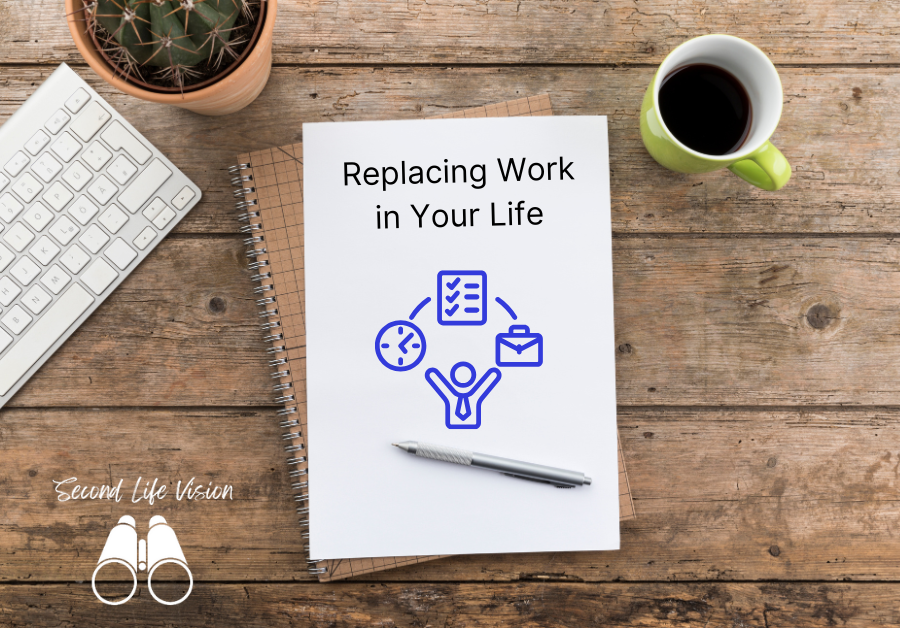When you meet someone new at a social gathering, the first question they often ask is “What do you do?” After retirement, it’s more difficult to answer that question. Without a solid plan to replace work in your life, you may find yourself saying “I used to be…”
Retirement is an opportunity to reinvent yourself and explore activities that bring you joy and fulfilment. Finding ways to replace the role of work in your life is essential to thriving in your next chapter. And the sooner you start, the better!
Defining ourselves by our careers
Too often in our culture, work defines who we are. Work is important and can give you a sense of purpose, accomplishment, status, and social connection. But work is just one dimension of a well-rounded life and, when you consider the legacy you want to leave behind, it’s likely not the most important.
The biggest downside of letting career success define your identity is that a job can change, or be gone, at any moment. If work is the focal point of your life, and you suddenly find you no longer have the job you invested your time and energy in, it could be devastating. In his book Retirement Heaven or Hell, Mike Drak discusses his experience with “Sudden Retirement Shock” and how it led to a battle with depression.
Even if you love your job, one day you’ll be ready to move on. Or you may find you are no longer able to work for health reasons. When that day comes, not having outside interests to keep you occupied could lead to boredom. Studies have shown that boredom can be detrimental to your physical and mental health and can even shorten your life.
Creating a plan to replace work in your life
Taking some time now to start building a life that is about more than work can help you make a successful transition to retirement. The sooner you start the better!
In Atomic Habits, James Clear suggests redefining yourself so you get to keep the important aspects of your personality even if your role changes. This is critical as you prepare for a major life transition like retirement.
Working with a retirement coach will help you assess your current level of satisfaction in several areas that are key to a successful retirement. This assessment involves reflecting on who you are today, and defining who you want to be.

You’ll look at all areas of a well-rounded life, including physical and mental health, social connections, home and community, and sources of meaning and purpose.
Health and wellbeing. How satisfied are you with your physical health and fitness routine? What about your mental health and emotional wellbeing? Do you have a positive attitude toward aging?
Social connections. How satisfied are you with your family relationships and friendships? Do you feel connected to your community?
Home and location. Are you satisfied with your home? Will you stay where you are or move to a different location?
Sources of meaning and purpose. How will you fill your time in retirement? How will you replace the sense of purpose you get from your job?
Financial readiness is part of the conversation because you need the financial resources to support the life you want to build. But don’t fall into the trap of believing that money alone will guarantee a happy retirement. Without a plan for the other elements, you may feel something is missing no matter how much money you have.
Investing in your future wellbeing
Your retirement readiness assessment will likely identify areas where you need to take action. Your retirement coach can help you create short- and long-term plans to improve areas of lower satisfaction and to build a plan where you’re excited about the possibilities.
Life is busy, and you may think you can put off making changes until you’ve retired and have more time on your hands. Starting with small steps now can help you avoid the negative health implications of retirement shock.
In his book The Ripple Effect, Dr. Greg Wells suggests focusing on being one percent better. He proposes starting with small changes that will eventually lead to bigger change. One percent of your time is just 15 minutes a day.
And the best part is, small changes add up over time. In Atomic Habits, James Clear suggests even two minutes a day is enough to start a habit you can build on.
Whether you spend two minutes a day or fifteen, consider it an investment in your future wellbeing.
Are you ready to invest in your future wellbeing and get started on creating a plan to replace work in your life? Contact me to learn how I can help you.

Comments
2 responses to “How will you replace work in your life?”
Awesome post, Michelle! I love the fact that we can spend such a short amount of time to start a habit you can build on! This is very good news, and one I think everyone can do! Thank you, Michelle! Cher xoxoxo
Thanks Cher. You’re right! Everyone can spare a few minutes a day to build a new habit.